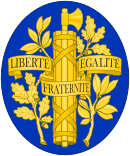1958 French legislative election
| |||||||||||||||||||||||||||||||||||||
All 576 seats in the National Assembly 290 seats needed for a majority | |||||||||||||||||||||||||||||||||||||
This lists parties that won seats. See the complete results below.
| |||||||||||||||||||||||||||||||||||||
 |
|---|
Legislative elections were held in France on 23 and 30 November 1958 to elect the first National Assembly of the French Fifth Republic.[1]
Since 1954, the French Fourth Republic had been mired in the Algerian War.[2] In May 1958, Pierre Pflimlin, a Christian-Democrat, became Prime Minister.[3] He was known to be in favour of a negotiated settlement with the Algerian nationalists.[4]
On 13 May, riots broke out in Algiers, with the complicity of the army in what is known as the May 1958 crisis in France.[5] A rebel government seized power in Algiers in order to defend "French Algeria". The next day, General Massu demanded the return to power of General Charles de Gaulle.[6]
The rebellious generals took control of
On 28 September the new constitution was approved in a referendum in the French Union by 83% of all voters, and in metropolitan France by 79% of voters. The Fifth Republic was born. The two-round system was re-established for the legislative elections.[11] The Gaullists created the Union for the New Republic which became the largest parliamentary group. Their opponents received vastly less seats with in particular the PCF losing 137 seats compared to 1956. The small number of left-wing deputies elected may be explained by divisions among left-leaning parties between supporters and opponents to the Fifth Republic: the two-round ballot tends to reward parties which are able to form alliances with each other.[12] As such, De Gaulle's new party formed a coalition with the CNIP to form a new government.
On 21 December de Gaulle was elected President of France by an electoral college.[13] His Justice Minister Michel Debré became Prime Minister.[14] The pro-Fifth Republic center-left parties (SFIO and Radical Party) left the presidential majority.[15][1] This established the first Gaullist centre-right government.
Results (Metropolitan France)
| Party | First round | Second round | Total seats | |||
|---|---|---|---|---|---|---|
| Votes | % | Votes | % | |||
French Section of the Workers International | 3,167,354 | 15.45 | 2,484,417 | 13.80 | 40 | |
| Radical Party, Dissidents and Republican Centre | 2,695,287 | 13.15 | 1,398,409 | 7.77 | 37 | |
| Popular Republican Movement and Christian Democrats | 2,387,788 | 11.65 | 1,365,064 | 7.58 | 57 | |
| Far-right | 669,518 | 3.27 | 1 | |||
| Total | 20,498,709 | 100.00 | 18,008,409 | 100.00 | 466 | |
| Source: Macridis & Brown[16] | ||||||
Notes
- ^ a b Macridis & Brown 1960, pp. 253–266.
- ^ Macridis & Brown 1960, pp. 26–44.
- ^ Laponce 1961, pp. 1–2.
- ^ Laponce 1961, pp. 9–10; Macridis & Brown 1960, pp. 60–61.
- ^ Macridis & Brown 1960, p. 62.
- ^ a b Watson 2003, pp. 123–129; Macridis & Brown 1960, pp. 81–91.
- ^ a b Macridis & Brown 1960, pp. 92–97.
- ^ Laponce 1961, pp. 12–13; Macridis & Brown 1960, p. 154.
- ^ Macridis & Brown 1960, p. 117.
- ^ Mitterrand 1964.
- ^ Macridis & Brown 1960, pp. 210–236, 335–358.
- ^ Macridis & Brown 1960, pp. 249–266.
- ^ Macridis & Brown 1960, p. 182, 270.
- ^ Macridis & Brown 1960, p. 152, 273.
- ^ Macridis & Brown 1960, pp. 242–246.
- ^ Macridis & Brown 1960, p. 258, N.B.: Unofficial and partly reconstructed
References
- Macridis, Roy C; Brown, Bernard Edward (1960). Long, Norton E. (ed.). The De Gaulle Republic: Quest For Unity. The Dorsey Series in Political Science (1st ed.). Homewood: The Dorsey Press. OCLC 408387. Retrieved 11 November 2014.
- Laponce, J. A. (1961). The government of the Fifth Republic: French Political Parties and the Constitution. Berkeley, Los Angeles; London: University of California; Cambridge University. OCLC 501634. Retrieved 11 November 2014 – via Internet Archive.
- Watson, William E. (2003). Tricolor and Crescent: France and the Islamic World. Perspectives on the twentieth century (10th ed.). Westport: Praeger. OCLC 50322732. Retrieved 11 November 2014.
- Mitterrand, François (1964). Le Coup d'Etat permanent (in French). Paris: Plon.
- "Les évènements amenant de Gaulle au pouvoir | INA". Institut National de l'audiovisuel (in French). Retrieved 12 March 2024.
